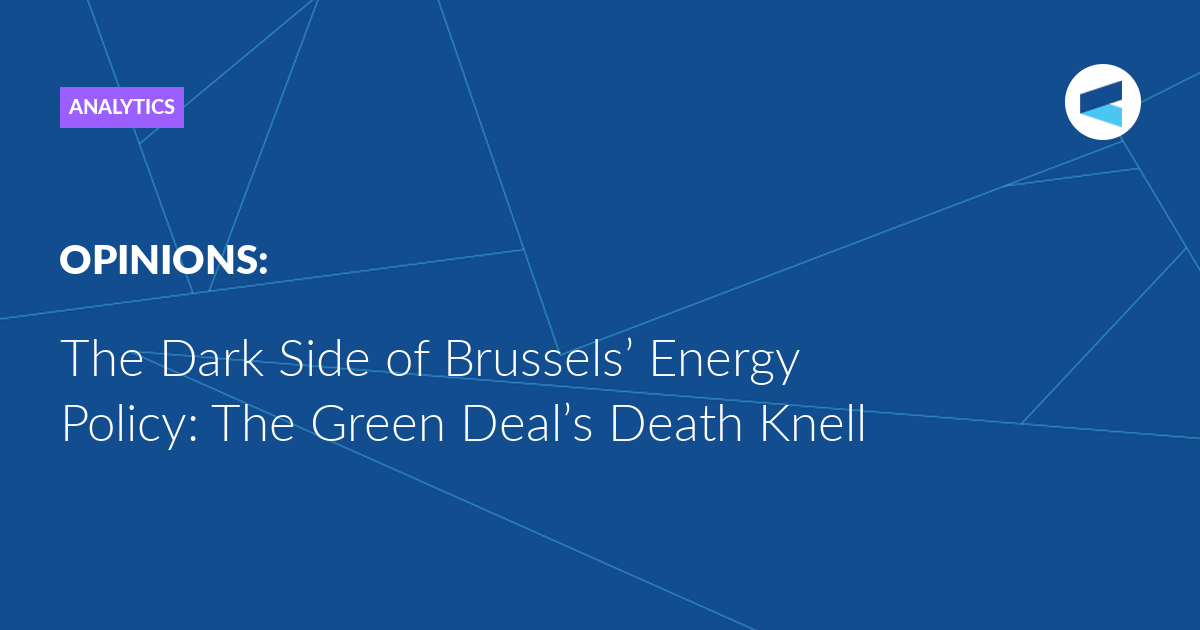Any measure that hinders the supply of affordable energy to Europe, such as the continuation of sanctions or a premature withdrawal from long-term gas supply contracts, will cause massive damage to the European economy and set the EU back by years, if not decades, Ulrike Reisner writes.
Pursued under the concept of the Green Deal, the energy transition has been one of the strongest and most damaging factors influencing the economy of the Federal Republic of Germany, and therefore the economy of Europe. This policy is primarily being pursued by Ursula von der Leyen’s European Commission and Olaf Scholz’s cabinet. Economic figures are poor, energy prices are a burden on the economy and society alike, and yet important political decisions continue to be subject to the dictates of the energy transition.
In early March, the German Federal Audit Office presented a special report on the implementation of the energy transition, which addressed the affordability, supply security, and environmental compatibility of electrical power. The results were alarming: the security of Germany’s supply is massively jeopardised. The report states:
“The measures taken so far to implement the energy transition are inadequate and therefore harbour serious risks for the energy policy goals. The German government is behind schedule in the expansion of renewable energies, the electricity grids as well as the development of backup capacities. (…) The urgently needed grid expansion is seven years and 6,000 kilometres behind schedule.” For critical observers of Germany’s predicament, this harsh judgment is long overdue. For the public, however, it is likely to come as more of a surprise, as energy issues have been at the top of the political agenda in both Brussels and Berlin for years.
Germany’s energy transition…
The roots of the German energy transition date back to 2014. At that time, Chancellor Angela Merkel’s cabinet decided to reduce carbon emissions to 750 million tonnes by 2020. This would have corresponded to a reduction of 40% compared to the 1990 level. In 2016, the climate protection plan was presented with the even more ambitious target of reducing carbon emissions by 55% by 2030 and 70% by 2040. For the first time, a complete renunciation of carbon and a “neutral” greenhouse gas balance, i.e. a reduction of 100%, was mentioned.
As with so many things in politics, this was a short-term vision. There was neither a cost calculation, nor an assessment of the technical feasibility, nor a study on the effects on the competitiveness of the German economy. At that time, the share of renewables in the electricity sector was around 30%, in the heating market only 13% and in the fuel market only 5%.
Nevertheless, the German Academy of Science and Engineering presented a cost estimate at the time. The results were so shocking that they were withheld from the public, and for good reason: A 90% reduction in emissions would not only double Germany’s electricity consumption, but the cost of this would amount to an incredible 4,100 billion euros. In the chemical industry alone, the third largest sector in Germany, the demand for electricity would increase enormously. Instead of the current 54 TWh, this sector would require 600 TWh of electricity.
…and Brussels’ Green Deal
In 2019, the Wall Street Journal called Germany the country with the “dumbest energy policy in the world” due to its decision to phase out nuclear power and coal. However, this has not stopped the Commission in Brussels, led by Ursula von der Leyen, from deciding to create a climate-neutral Europe by 2050. Here, too, the ambitious goal is to emit zero greenhouse gases by 2050. The Green Deal is not only intended to protect the environment, but also to promote the economy:
“The European Green Deal is also our lifeline out of the COVID-19 pandemic. One third of the 1.8 trillion-euro investments from the NextGenerationEU Recovery Plan, and the EU’s seven-year budget will finance the European Green Deal.”
Recently, the Commission defined its new political goals in this regard: the decarbonisation of industry using wind energy, hydropower, electrolysers, and other existing resources, as well as the expansion of domestic production capacities for the manufacture of batteries, electric vehicles, heat pumps and solar cells.
An EU strategy for industrial CO2 management was also adopted to ensure investment in technologies to capture, store and reuse CO2. These are additional costs that place a massive burden on the private and public economy at a time of economic stagnation – in addition to the high energy costs, which are not least due to the EU’s sanctions policy towards the Russian Federation.
The European Union’s Green Deal must be criticised for three reasons: it is dogmatic, because it does not provide for alternative scenarios; it is economically highly problematic, because it burdens industry in Europe with costs and uncertainties and therefore restricts its international competitiveness; and it is technologically immature and unrealistic: neither the market-ready technologies nor the financial means to implement the Commission’s goal of reducing net greenhouse gas emissions to zero by 2050 are available.
Damage to the economy
In connection with the dark side of the Brussels energy regime, we have already reported on the home-made energy crisis and the lobbying interests behind it:
The European Commission, together with the Council, has been intervening massively in the European energy market for two years – without a proper legislative procedure, without involving the European Parliament and disregarding the Member States’ reservations of sovereignty. In doing so, it is utilising a legal clause that presupposes a precarious economic situation that can only be overcome in the form of emergency measures. The events in February 2022, which were to mark the beginning of an “energy crisis”, were a major, though certainly not the only, cause.
Under the sanctions, the purchase, import or transfer of crude oil and certain petroleum products by sea from the Russian Federation to the EU has been banned; Member States have set an oil price cap; there is a ban on the import of all types of Russian coal, a ban on new EU investment in the Russian mining sector, and a ban on the export of certain oil refining technologies; and Germany and Poland no longer import Russian pipeline oil.
The current energy policy in Brussels and Berlin must be judged against this background. It is currently reflected in
• growing uncertainty in the security of supply due to outdated and inadequate grids.
• persistently high prices due to sanctions against the Russian Federation and Iran and the associated impact on the energy markets.
• declining competitiveness due to excessive costs with loss of jobs and social welfare; and
• a noticeable promotion of authoritarian structures in the Union due to a systematic abuse of the emergency clause; the competences and political room for manoeuvre of the Commission and Council were massively expanded without democratic backing and without a basis in international law.
The supply of affordable energy to the European economy is becoming essential against the backdrop of growing energy demand resulting from advancing digitalisation and the need for industry to remain competitive.
Any measure that hinders the supply of affordable energy to Europe, such as the continuation of sanctions or a premature withdrawal from long-term gas supply contracts, will cause massive damage to the European economy and set the EU back by years, if not decades.
The Valdai Discussion Club was established in 2004. It is named after Lake Valdai, which is located close to Veliky Novgorod, where the Club’s first meeting took place.
Please visit the firm link to site






